Comparative Business Ethics and Social Responsibility: Uber Report
VerifiedAdded on 2023/04/04
|12
|3641
|481
Report
AI Summary
This report provides a comprehensive analysis of the ethical challenges faced by Uber, focusing on the case study "Uber Hits a Bump in the Road." It examines various ethical issues stemming from Uber's business model and organizational policies, including breaches of passenger and driver rights, privacy failures, unethical leadership, and non-compliance with legal obligations. The report identifies key risks that Uber needs to address for sustainable growth, such as passenger safety, driver protection, data security, and pricing strategy adjustments. Furthermore, it evaluates areas where regulations are needed, including cybersecurity, insurance, employment laws, taxation, and competition. The analysis incorporates ethical theories like Consequentialism and Deontology to assess Uber's actions and proposes recommendations for ethical improvements and regulatory frameworks.
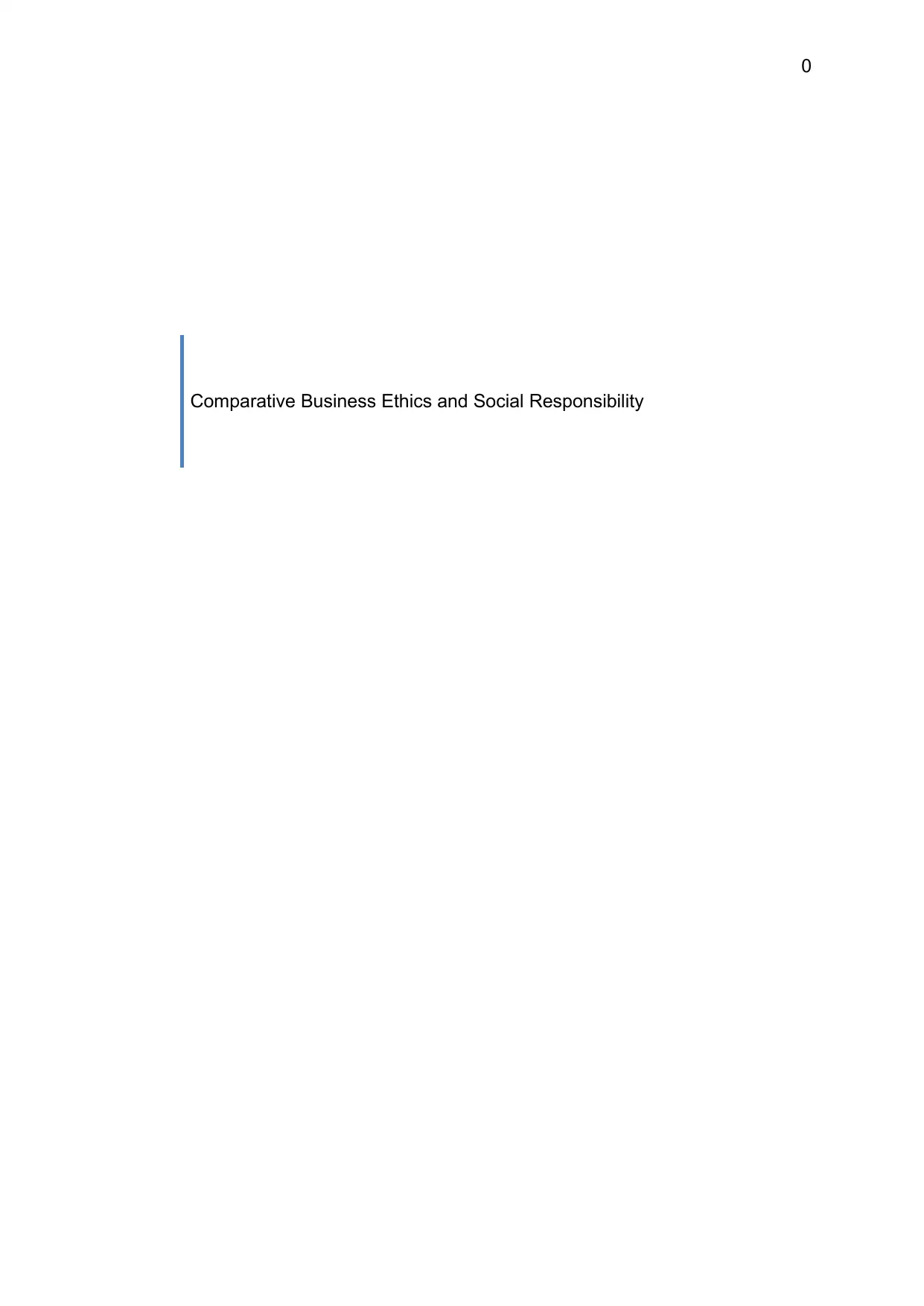
0
Comparative Business Ethics and Social Responsibility
Comparative Business Ethics and Social Responsibility
Paraphrase This Document
Need a fresh take? Get an instant paraphrase of this document with our AI Paraphraser
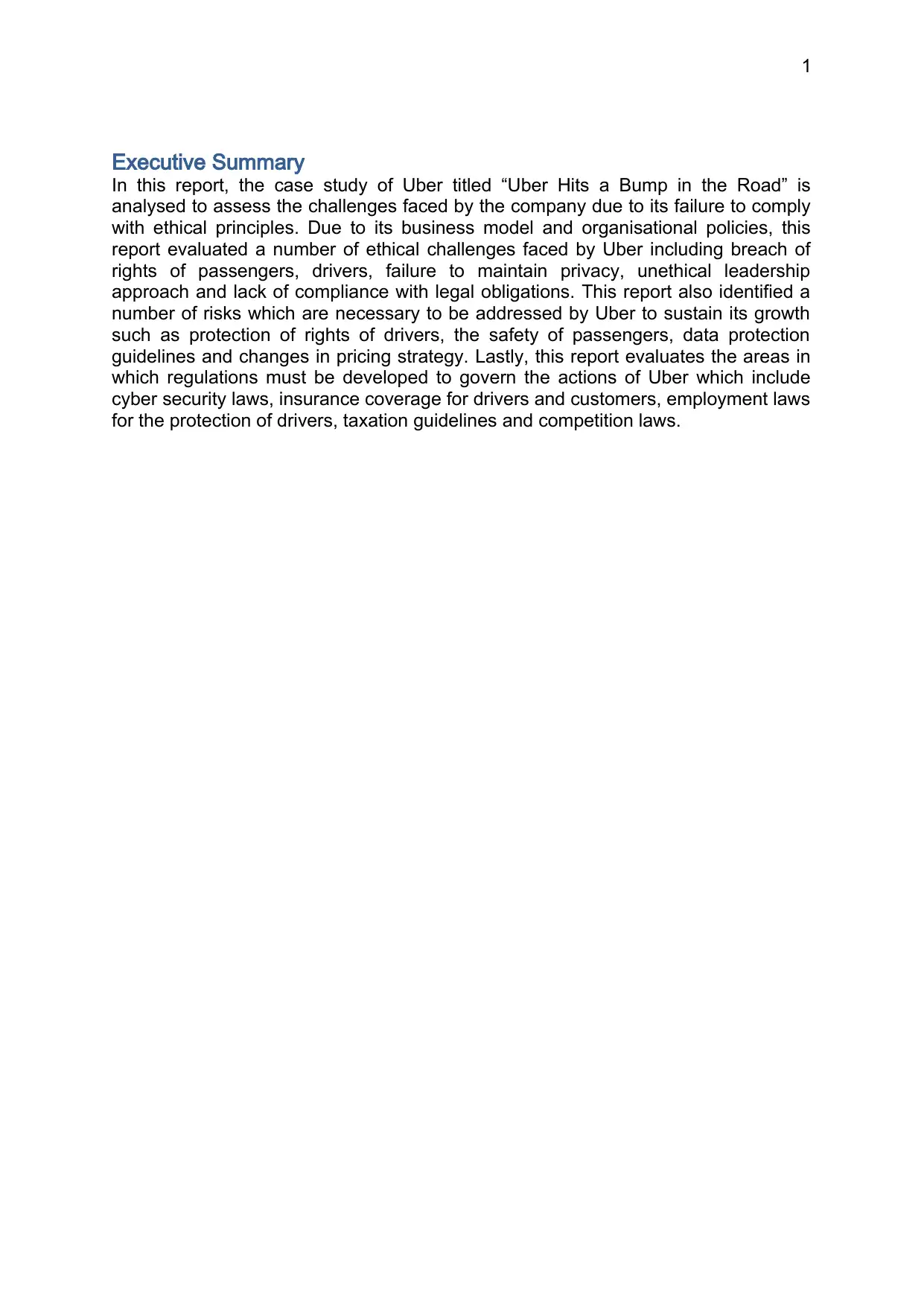
1
Executive Summary
In this report, the case study of Uber titled “Uber Hits a Bump in the Road” is
analysed to assess the challenges faced by the company due to its failure to comply
with ethical principles. Due to its business model and organisational policies, this
report evaluated a number of ethical challenges faced by Uber including breach of
rights of passengers, drivers, failure to maintain privacy, unethical leadership
approach and lack of compliance with legal obligations. This report also identified a
number of risks which are necessary to be addressed by Uber to sustain its growth
such as protection of rights of drivers, the safety of passengers, data protection
guidelines and changes in pricing strategy. Lastly, this report evaluates the areas in
which regulations must be developed to govern the actions of Uber which include
cyber security laws, insurance coverage for drivers and customers, employment laws
for the protection of drivers, taxation guidelines and competition laws.
Executive Summary
In this report, the case study of Uber titled “Uber Hits a Bump in the Road” is
analysed to assess the challenges faced by the company due to its failure to comply
with ethical principles. Due to its business model and organisational policies, this
report evaluated a number of ethical challenges faced by Uber including breach of
rights of passengers, drivers, failure to maintain privacy, unethical leadership
approach and lack of compliance with legal obligations. This report also identified a
number of risks which are necessary to be addressed by Uber to sustain its growth
such as protection of rights of drivers, the safety of passengers, data protection
guidelines and changes in pricing strategy. Lastly, this report evaluates the areas in
which regulations must be developed to govern the actions of Uber which include
cyber security laws, insurance coverage for drivers and customers, employment laws
for the protection of drivers, taxation guidelines and competition laws.

2
Table of Contents
Introduction...................................................................................................................3
Ethics Challenges that Uber Faces..............................................................................4
Threats which Uber should overcome..........................................................................5
Development of regulations for Uber............................................................................7
Conclusion....................................................................................................................9
References.................................................................................................................10
Table of Contents
Introduction...................................................................................................................3
Ethics Challenges that Uber Faces..............................................................................4
Threats which Uber should overcome..........................................................................5
Development of regulations for Uber............................................................................7
Conclusion....................................................................................................................9
References.................................................................................................................10
⊘ This is a preview!⊘
Do you want full access?
Subscribe today to unlock all pages.

Trusted by 1+ million students worldwide
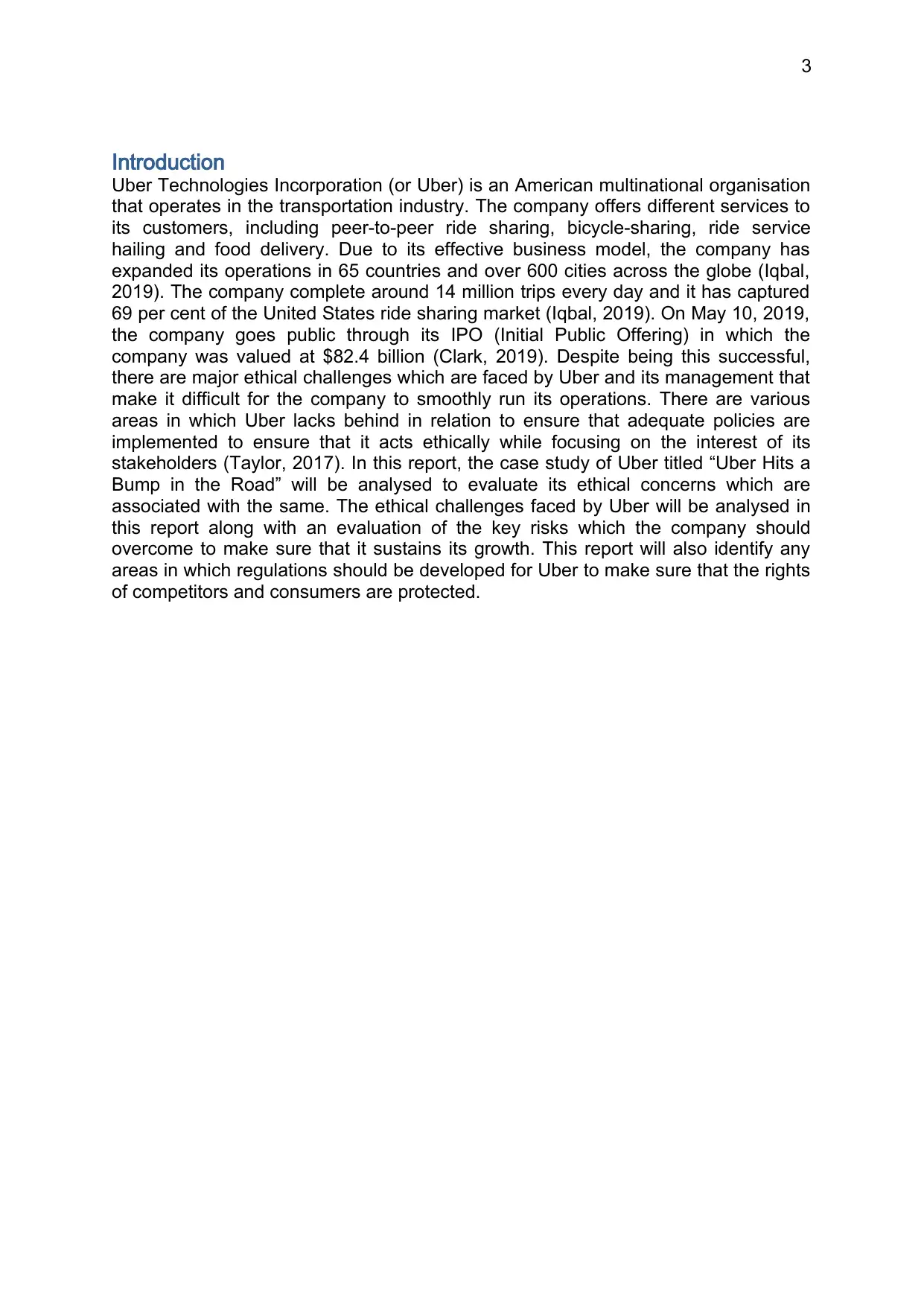
3
Introduction
Uber Technologies Incorporation (or Uber) is an American multinational organisation
that operates in the transportation industry. The company offers different services to
its customers, including peer-to-peer ride sharing, bicycle-sharing, ride service
hailing and food delivery. Due to its effective business model, the company has
expanded its operations in 65 countries and over 600 cities across the globe (Iqbal,
2019). The company complete around 14 million trips every day and it has captured
69 per cent of the United States ride sharing market (Iqbal, 2019). On May 10, 2019,
the company goes public through its IPO (Initial Public Offering) in which the
company was valued at $82.4 billion (Clark, 2019). Despite being this successful,
there are major ethical challenges which are faced by Uber and its management that
make it difficult for the company to smoothly run its operations. There are various
areas in which Uber lacks behind in relation to ensure that adequate policies are
implemented to ensure that it acts ethically while focusing on the interest of its
stakeholders (Taylor, 2017). In this report, the case study of Uber titled “Uber Hits a
Bump in the Road” will be analysed to evaluate its ethical concerns which are
associated with the same. The ethical challenges faced by Uber will be analysed in
this report along with an evaluation of the key risks which the company should
overcome to make sure that it sustains its growth. This report will also identify any
areas in which regulations should be developed for Uber to make sure that the rights
of competitors and consumers are protected.
Introduction
Uber Technologies Incorporation (or Uber) is an American multinational organisation
that operates in the transportation industry. The company offers different services to
its customers, including peer-to-peer ride sharing, bicycle-sharing, ride service
hailing and food delivery. Due to its effective business model, the company has
expanded its operations in 65 countries and over 600 cities across the globe (Iqbal,
2019). The company complete around 14 million trips every day and it has captured
69 per cent of the United States ride sharing market (Iqbal, 2019). On May 10, 2019,
the company goes public through its IPO (Initial Public Offering) in which the
company was valued at $82.4 billion (Clark, 2019). Despite being this successful,
there are major ethical challenges which are faced by Uber and its management that
make it difficult for the company to smoothly run its operations. There are various
areas in which Uber lacks behind in relation to ensure that adequate policies are
implemented to ensure that it acts ethically while focusing on the interest of its
stakeholders (Taylor, 2017). In this report, the case study of Uber titled “Uber Hits a
Bump in the Road” will be analysed to evaluate its ethical concerns which are
associated with the same. The ethical challenges faced by Uber will be analysed in
this report along with an evaluation of the key risks which the company should
overcome to make sure that it sustains its growth. This report will also identify any
areas in which regulations should be developed for Uber to make sure that the rights
of competitors and consumers are protected.
Paraphrase This Document
Need a fresh take? Get an instant paraphrase of this document with our AI Paraphraser
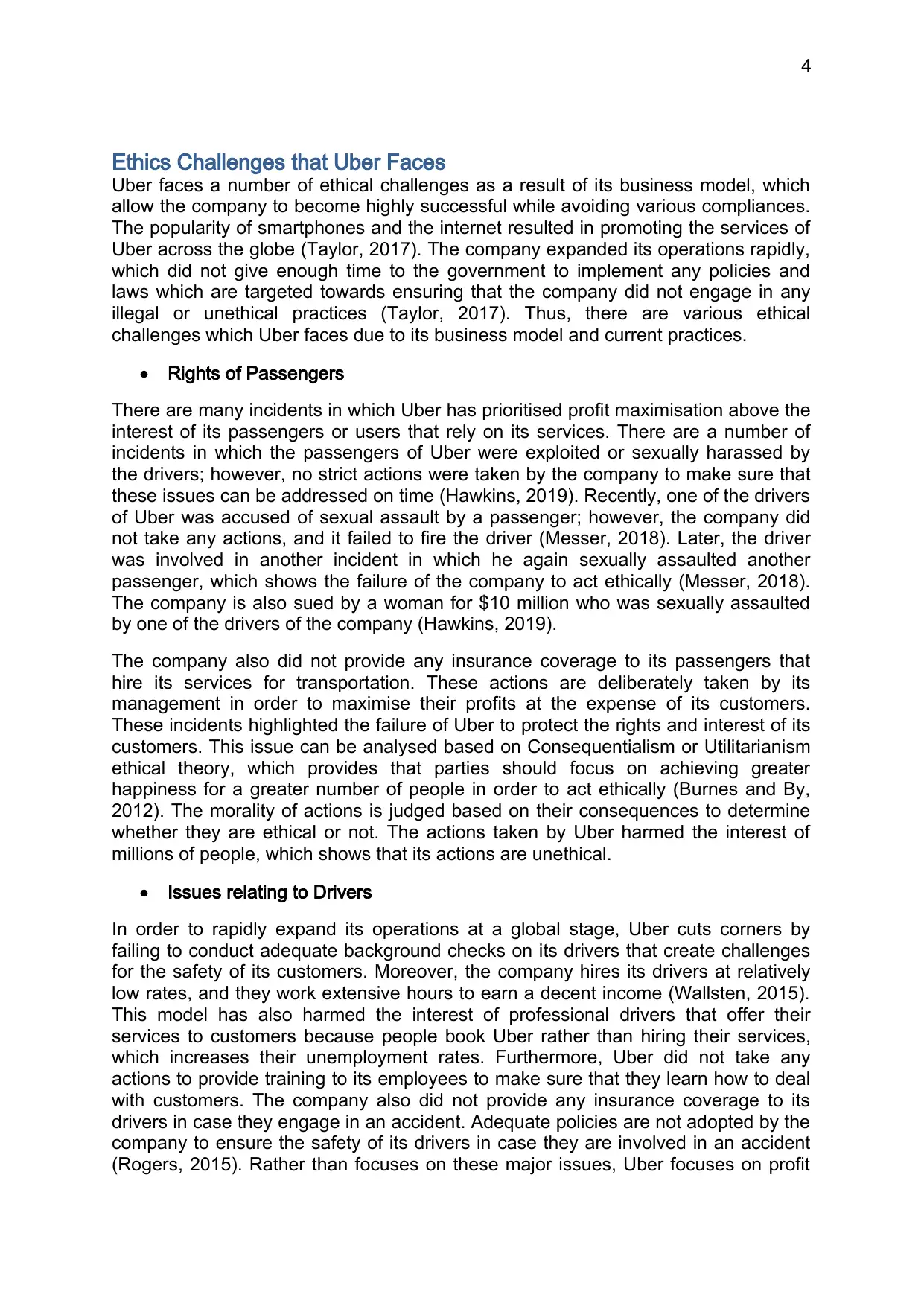
4
Ethics Challenges that Uber Faces
Uber faces a number of ethical challenges as a result of its business model, which
allow the company to become highly successful while avoiding various compliances.
The popularity of smartphones and the internet resulted in promoting the services of
Uber across the globe (Taylor, 2017). The company expanded its operations rapidly,
which did not give enough time to the government to implement any policies and
laws which are targeted towards ensuring that the company did not engage in any
illegal or unethical practices (Taylor, 2017). Thus, there are various ethical
challenges which Uber faces due to its business model and current practices.
Rights of Passengers
There are many incidents in which Uber has prioritised profit maximisation above the
interest of its passengers or users that rely on its services. There are a number of
incidents in which the passengers of Uber were exploited or sexually harassed by
the drivers; however, no strict actions were taken by the company to make sure that
these issues can be addressed on time (Hawkins, 2019). Recently, one of the drivers
of Uber was accused of sexual assault by a passenger; however, the company did
not take any actions, and it failed to fire the driver (Messer, 2018). Later, the driver
was involved in another incident in which he again sexually assaulted another
passenger, which shows the failure of the company to act ethically (Messer, 2018).
The company is also sued by a woman for $10 million who was sexually assaulted
by one of the drivers of the company (Hawkins, 2019).
The company also did not provide any insurance coverage to its passengers that
hire its services for transportation. These actions are deliberately taken by its
management in order to maximise their profits at the expense of its customers.
These incidents highlighted the failure of Uber to protect the rights and interest of its
customers. This issue can be analysed based on Consequentialism or Utilitarianism
ethical theory, which provides that parties should focus on achieving greater
happiness for a greater number of people in order to act ethically (Burnes and By,
2012). The morality of actions is judged based on their consequences to determine
whether they are ethical or not. The actions taken by Uber harmed the interest of
millions of people, which shows that its actions are unethical.
Issues relating to Drivers
In order to rapidly expand its operations at a global stage, Uber cuts corners by
failing to conduct adequate background checks on its drivers that create challenges
for the safety of its customers. Moreover, the company hires its drivers at relatively
low rates, and they work extensive hours to earn a decent income (Wallsten, 2015).
This model has also harmed the interest of professional drivers that offer their
services to customers because people book Uber rather than hiring their services,
which increases their unemployment rates. Furthermore, Uber did not take any
actions to provide training to its employees to make sure that they learn how to deal
with customers. The company also did not provide any insurance coverage to its
drivers in case they engage in an accident. Adequate policies are not adopted by the
company to ensure the safety of its drivers in case they are involved in an accident
(Rogers, 2015). Rather than focuses on these major issues, Uber focuses on profit
Ethics Challenges that Uber Faces
Uber faces a number of ethical challenges as a result of its business model, which
allow the company to become highly successful while avoiding various compliances.
The popularity of smartphones and the internet resulted in promoting the services of
Uber across the globe (Taylor, 2017). The company expanded its operations rapidly,
which did not give enough time to the government to implement any policies and
laws which are targeted towards ensuring that the company did not engage in any
illegal or unethical practices (Taylor, 2017). Thus, there are various ethical
challenges which Uber faces due to its business model and current practices.
Rights of Passengers
There are many incidents in which Uber has prioritised profit maximisation above the
interest of its passengers or users that rely on its services. There are a number of
incidents in which the passengers of Uber were exploited or sexually harassed by
the drivers; however, no strict actions were taken by the company to make sure that
these issues can be addressed on time (Hawkins, 2019). Recently, one of the drivers
of Uber was accused of sexual assault by a passenger; however, the company did
not take any actions, and it failed to fire the driver (Messer, 2018). Later, the driver
was involved in another incident in which he again sexually assaulted another
passenger, which shows the failure of the company to act ethically (Messer, 2018).
The company is also sued by a woman for $10 million who was sexually assaulted
by one of the drivers of the company (Hawkins, 2019).
The company also did not provide any insurance coverage to its passengers that
hire its services for transportation. These actions are deliberately taken by its
management in order to maximise their profits at the expense of its customers.
These incidents highlighted the failure of Uber to protect the rights and interest of its
customers. This issue can be analysed based on Consequentialism or Utilitarianism
ethical theory, which provides that parties should focus on achieving greater
happiness for a greater number of people in order to act ethically (Burnes and By,
2012). The morality of actions is judged based on their consequences to determine
whether they are ethical or not. The actions taken by Uber harmed the interest of
millions of people, which shows that its actions are unethical.
Issues relating to Drivers
In order to rapidly expand its operations at a global stage, Uber cuts corners by
failing to conduct adequate background checks on its drivers that create challenges
for the safety of its customers. Moreover, the company hires its drivers at relatively
low rates, and they work extensive hours to earn a decent income (Wallsten, 2015).
This model has also harmed the interest of professional drivers that offer their
services to customers because people book Uber rather than hiring their services,
which increases their unemployment rates. Furthermore, Uber did not take any
actions to provide training to its employees to make sure that they learn how to deal
with customers. The company also did not provide any insurance coverage to its
drivers in case they engage in an accident. Adequate policies are not adopted by the
company to ensure the safety of its drivers in case they are involved in an accident
(Rogers, 2015). Rather than focuses on these major issues, Uber focuses on profit
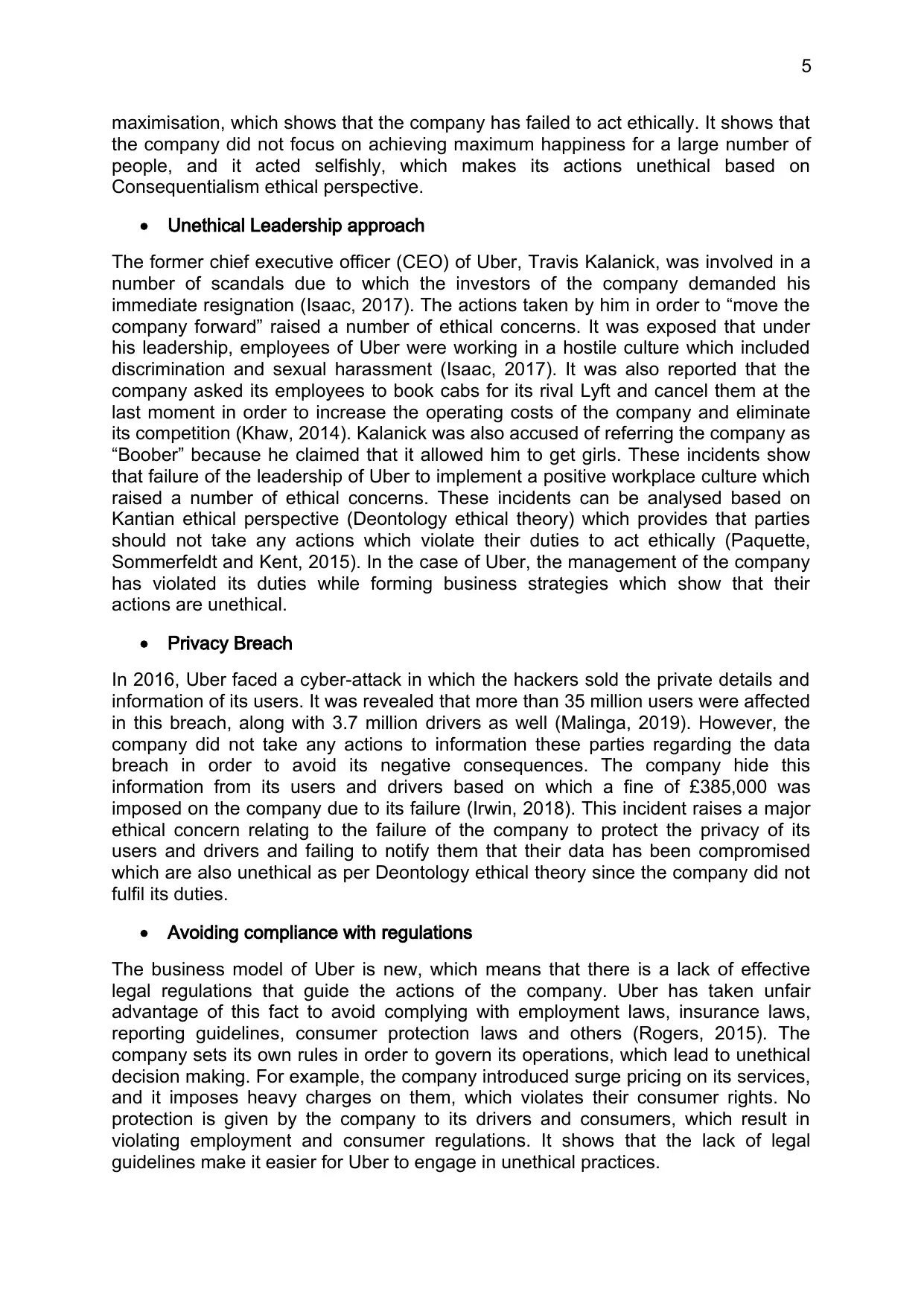
5
maximisation, which shows that the company has failed to act ethically. It shows that
the company did not focus on achieving maximum happiness for a large number of
people, and it acted selfishly, which makes its actions unethical based on
Consequentialism ethical perspective.
Unethical Leadership approach
The former chief executive officer (CEO) of Uber, Travis Kalanick, was involved in a
number of scandals due to which the investors of the company demanded his
immediate resignation (Isaac, 2017). The actions taken by him in order to “move the
company forward” raised a number of ethical concerns. It was exposed that under
his leadership, employees of Uber were working in a hostile culture which included
discrimination and sexual harassment (Isaac, 2017). It was also reported that the
company asked its employees to book cabs for its rival Lyft and cancel them at the
last moment in order to increase the operating costs of the company and eliminate
its competition (Khaw, 2014). Kalanick was also accused of referring the company as
“Boober” because he claimed that it allowed him to get girls. These incidents show
that failure of the leadership of Uber to implement a positive workplace culture which
raised a number of ethical concerns. These incidents can be analysed based on
Kantian ethical perspective (Deontology ethical theory) which provides that parties
should not take any actions which violate their duties to act ethically (Paquette,
Sommerfeldt and Kent, 2015). In the case of Uber, the management of the company
has violated its duties while forming business strategies which show that their
actions are unethical.
Privacy Breach
In 2016, Uber faced a cyber-attack in which the hackers sold the private details and
information of its users. It was revealed that more than 35 million users were affected
in this breach, along with 3.7 million drivers as well (Malinga, 2019). However, the
company did not take any actions to information these parties regarding the data
breach in order to avoid its negative consequences. The company hide this
information from its users and drivers based on which a fine of £385,000 was
imposed on the company due to its failure (Irwin, 2018). This incident raises a major
ethical concern relating to the failure of the company to protect the privacy of its
users and drivers and failing to notify them that their data has been compromised
which are also unethical as per Deontology ethical theory since the company did not
fulfil its duties.
Avoiding compliance with regulations
The business model of Uber is new, which means that there is a lack of effective
legal regulations that guide the actions of the company. Uber has taken unfair
advantage of this fact to avoid complying with employment laws, insurance laws,
reporting guidelines, consumer protection laws and others (Rogers, 2015). The
company sets its own rules in order to govern its operations, which lead to unethical
decision making. For example, the company introduced surge pricing on its services,
and it imposes heavy charges on them, which violates their consumer rights. No
protection is given by the company to its drivers and consumers, which result in
violating employment and consumer regulations. It shows that the lack of legal
guidelines make it easier for Uber to engage in unethical practices.
maximisation, which shows that the company has failed to act ethically. It shows that
the company did not focus on achieving maximum happiness for a large number of
people, and it acted selfishly, which makes its actions unethical based on
Consequentialism ethical perspective.
Unethical Leadership approach
The former chief executive officer (CEO) of Uber, Travis Kalanick, was involved in a
number of scandals due to which the investors of the company demanded his
immediate resignation (Isaac, 2017). The actions taken by him in order to “move the
company forward” raised a number of ethical concerns. It was exposed that under
his leadership, employees of Uber were working in a hostile culture which included
discrimination and sexual harassment (Isaac, 2017). It was also reported that the
company asked its employees to book cabs for its rival Lyft and cancel them at the
last moment in order to increase the operating costs of the company and eliminate
its competition (Khaw, 2014). Kalanick was also accused of referring the company as
“Boober” because he claimed that it allowed him to get girls. These incidents show
that failure of the leadership of Uber to implement a positive workplace culture which
raised a number of ethical concerns. These incidents can be analysed based on
Kantian ethical perspective (Deontology ethical theory) which provides that parties
should not take any actions which violate their duties to act ethically (Paquette,
Sommerfeldt and Kent, 2015). In the case of Uber, the management of the company
has violated its duties while forming business strategies which show that their
actions are unethical.
Privacy Breach
In 2016, Uber faced a cyber-attack in which the hackers sold the private details and
information of its users. It was revealed that more than 35 million users were affected
in this breach, along with 3.7 million drivers as well (Malinga, 2019). However, the
company did not take any actions to information these parties regarding the data
breach in order to avoid its negative consequences. The company hide this
information from its users and drivers based on which a fine of £385,000 was
imposed on the company due to its failure (Irwin, 2018). This incident raises a major
ethical concern relating to the failure of the company to protect the privacy of its
users and drivers and failing to notify them that their data has been compromised
which are also unethical as per Deontology ethical theory since the company did not
fulfil its duties.
Avoiding compliance with regulations
The business model of Uber is new, which means that there is a lack of effective
legal regulations that guide the actions of the company. Uber has taken unfair
advantage of this fact to avoid complying with employment laws, insurance laws,
reporting guidelines, consumer protection laws and others (Rogers, 2015). The
company sets its own rules in order to govern its operations, which lead to unethical
decision making. For example, the company introduced surge pricing on its services,
and it imposes heavy charges on them, which violates their consumer rights. No
protection is given by the company to its drivers and consumers, which result in
violating employment and consumer regulations. It shows that the lack of legal
guidelines make it easier for Uber to engage in unethical practices.
⊘ This is a preview!⊘
Do you want full access?
Subscribe today to unlock all pages.

Trusted by 1+ million students worldwide
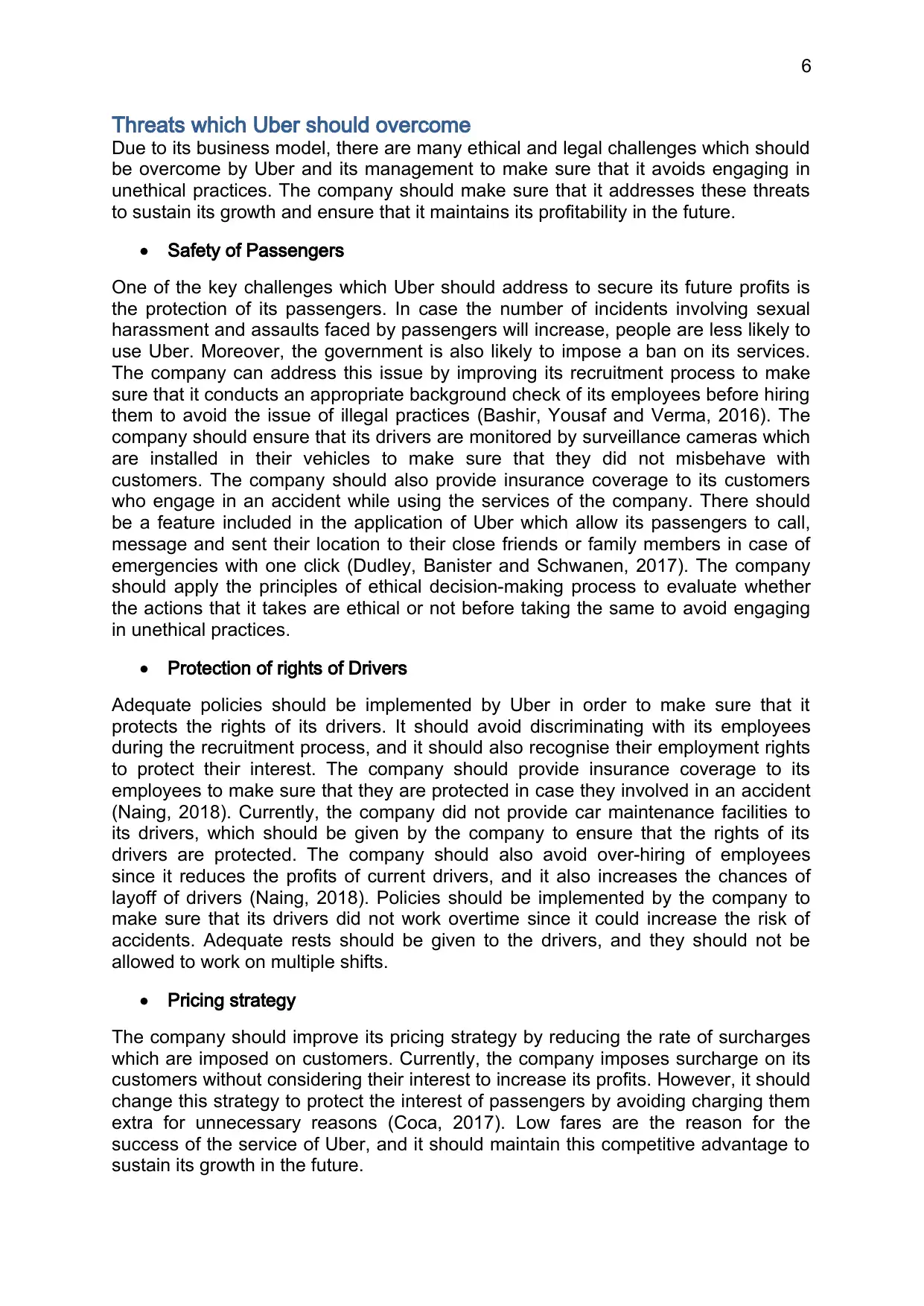
6
Threats which Uber should overcome
Due to its business model, there are many ethical and legal challenges which should
be overcome by Uber and its management to make sure that it avoids engaging in
unethical practices. The company should make sure that it addresses these threats
to sustain its growth and ensure that it maintains its profitability in the future.
Safety of Passengers
One of the key challenges which Uber should address to secure its future profits is
the protection of its passengers. In case the number of incidents involving sexual
harassment and assaults faced by passengers will increase, people are less likely to
use Uber. Moreover, the government is also likely to impose a ban on its services.
The company can address this issue by improving its recruitment process to make
sure that it conducts an appropriate background check of its employees before hiring
them to avoid the issue of illegal practices (Bashir, Yousaf and Verma, 2016). The
company should ensure that its drivers are monitored by surveillance cameras which
are installed in their vehicles to make sure that they did not misbehave with
customers. The company should also provide insurance coverage to its customers
who engage in an accident while using the services of the company. There should
be a feature included in the application of Uber which allow its passengers to call,
message and sent their location to their close friends or family members in case of
emergencies with one click (Dudley, Banister and Schwanen, 2017). The company
should apply the principles of ethical decision-making process to evaluate whether
the actions that it takes are ethical or not before taking the same to avoid engaging
in unethical practices.
Protection of rights of Drivers
Adequate policies should be implemented by Uber in order to make sure that it
protects the rights of its drivers. It should avoid discriminating with its employees
during the recruitment process, and it should also recognise their employment rights
to protect their interest. The company should provide insurance coverage to its
employees to make sure that they are protected in case they involved in an accident
(Naing, 2018). Currently, the company did not provide car maintenance facilities to
its drivers, which should be given by the company to ensure that the rights of its
drivers are protected. The company should also avoid over-hiring of employees
since it reduces the profits of current drivers, and it also increases the chances of
layoff of drivers (Naing, 2018). Policies should be implemented by the company to
make sure that its drivers did not work overtime since it could increase the risk of
accidents. Adequate rests should be given to the drivers, and they should not be
allowed to work on multiple shifts.
Pricing strategy
The company should improve its pricing strategy by reducing the rate of surcharges
which are imposed on customers. Currently, the company imposes surcharge on its
customers without considering their interest to increase its profits. However, it should
change this strategy to protect the interest of passengers by avoiding charging them
extra for unnecessary reasons (Coca, 2017). Low fares are the reason for the
success of the service of Uber, and it should maintain this competitive advantage to
sustain its growth in the future.
Threats which Uber should overcome
Due to its business model, there are many ethical and legal challenges which should
be overcome by Uber and its management to make sure that it avoids engaging in
unethical practices. The company should make sure that it addresses these threats
to sustain its growth and ensure that it maintains its profitability in the future.
Safety of Passengers
One of the key challenges which Uber should address to secure its future profits is
the protection of its passengers. In case the number of incidents involving sexual
harassment and assaults faced by passengers will increase, people are less likely to
use Uber. Moreover, the government is also likely to impose a ban on its services.
The company can address this issue by improving its recruitment process to make
sure that it conducts an appropriate background check of its employees before hiring
them to avoid the issue of illegal practices (Bashir, Yousaf and Verma, 2016). The
company should ensure that its drivers are monitored by surveillance cameras which
are installed in their vehicles to make sure that they did not misbehave with
customers. The company should also provide insurance coverage to its customers
who engage in an accident while using the services of the company. There should
be a feature included in the application of Uber which allow its passengers to call,
message and sent their location to their close friends or family members in case of
emergencies with one click (Dudley, Banister and Schwanen, 2017). The company
should apply the principles of ethical decision-making process to evaluate whether
the actions that it takes are ethical or not before taking the same to avoid engaging
in unethical practices.
Protection of rights of Drivers
Adequate policies should be implemented by Uber in order to make sure that it
protects the rights of its drivers. It should avoid discriminating with its employees
during the recruitment process, and it should also recognise their employment rights
to protect their interest. The company should provide insurance coverage to its
employees to make sure that they are protected in case they involved in an accident
(Naing, 2018). Currently, the company did not provide car maintenance facilities to
its drivers, which should be given by the company to ensure that the rights of its
drivers are protected. The company should also avoid over-hiring of employees
since it reduces the profits of current drivers, and it also increases the chances of
layoff of drivers (Naing, 2018). Policies should be implemented by the company to
make sure that its drivers did not work overtime since it could increase the risk of
accidents. Adequate rests should be given to the drivers, and they should not be
allowed to work on multiple shifts.
Pricing strategy
The company should improve its pricing strategy by reducing the rate of surcharges
which are imposed on customers. Currently, the company imposes surcharge on its
customers without considering their interest to increase its profits. However, it should
change this strategy to protect the interest of passengers by avoiding charging them
extra for unnecessary reasons (Coca, 2017). Low fares are the reason for the
success of the service of Uber, and it should maintain this competitive advantage to
sustain its growth in the future.
Paraphrase This Document
Need a fresh take? Get an instant paraphrase of this document with our AI Paraphraser
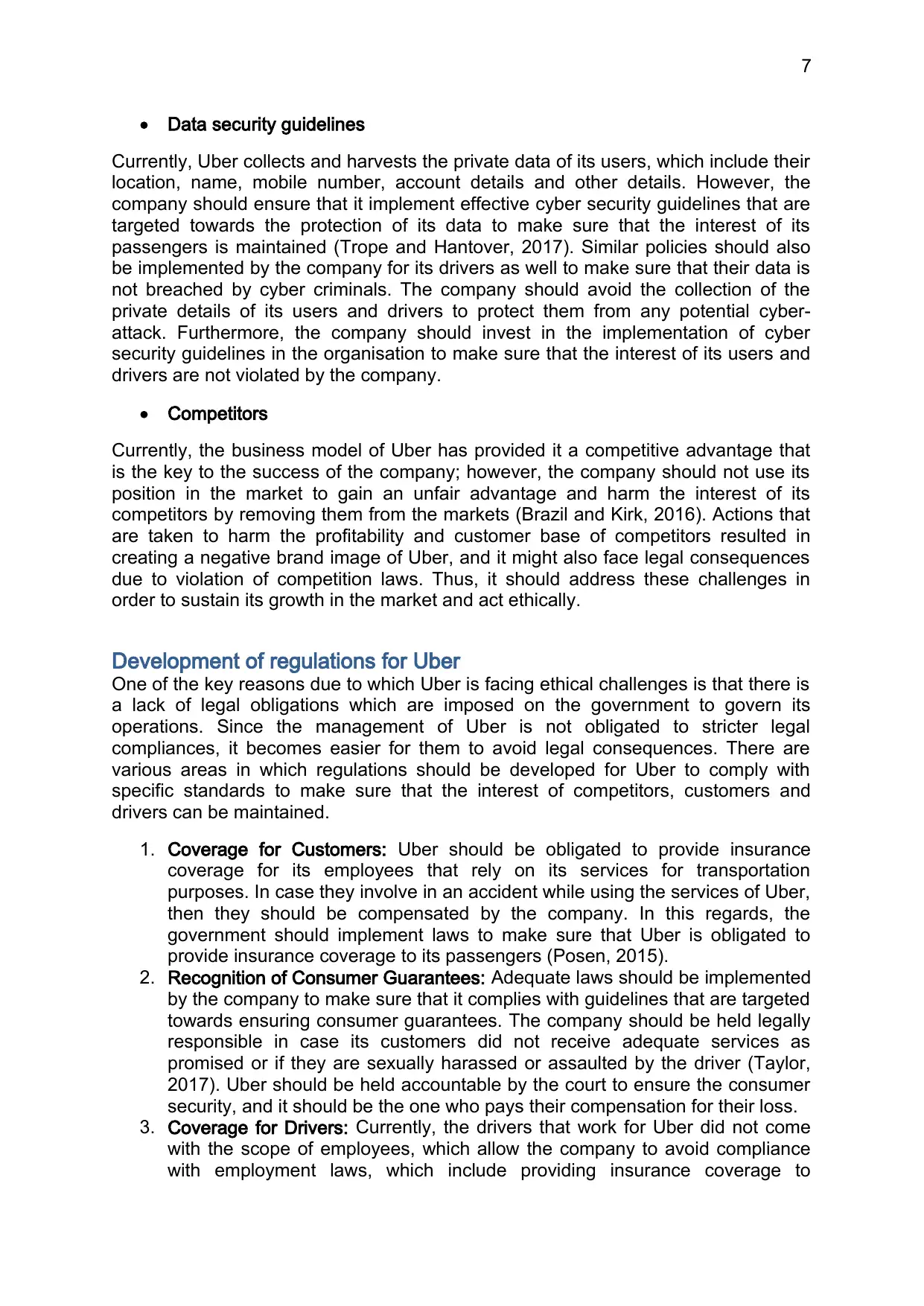
7
Data security guidelines
Currently, Uber collects and harvests the private data of its users, which include their
location, name, mobile number, account details and other details. However, the
company should ensure that it implement effective cyber security guidelines that are
targeted towards the protection of its data to make sure that the interest of its
passengers is maintained (Trope and Hantover, 2017). Similar policies should also
be implemented by the company for its drivers as well to make sure that their data is
not breached by cyber criminals. The company should avoid the collection of the
private details of its users and drivers to protect them from any potential cyber-
attack. Furthermore, the company should invest in the implementation of cyber
security guidelines in the organisation to make sure that the interest of its users and
drivers are not violated by the company.
Competitors
Currently, the business model of Uber has provided it a competitive advantage that
is the key to the success of the company; however, the company should not use its
position in the market to gain an unfair advantage and harm the interest of its
competitors by removing them from the markets (Brazil and Kirk, 2016). Actions that
are taken to harm the profitability and customer base of competitors resulted in
creating a negative brand image of Uber, and it might also face legal consequences
due to violation of competition laws. Thus, it should address these challenges in
order to sustain its growth in the market and act ethically.
Development of regulations for Uber
One of the key reasons due to which Uber is facing ethical challenges is that there is
a lack of legal obligations which are imposed on the government to govern its
operations. Since the management of Uber is not obligated to stricter legal
compliances, it becomes easier for them to avoid legal consequences. There are
various areas in which regulations should be developed for Uber to comply with
specific standards to make sure that the interest of competitors, customers and
drivers can be maintained.
1. Coverage for Customers: Uber should be obligated to provide insurance
coverage for its employees that rely on its services for transportation
purposes. In case they involve in an accident while using the services of Uber,
then they should be compensated by the company. In this regards, the
government should implement laws to make sure that Uber is obligated to
provide insurance coverage to its passengers (Posen, 2015).
2. Recognition of Consumer Guarantees: Adequate laws should be implemented
by the company to make sure that it complies with guidelines that are targeted
towards ensuring consumer guarantees. The company should be held legally
responsible in case its customers did not receive adequate services as
promised or if they are sexually harassed or assaulted by the driver (Taylor,
2017). Uber should be held accountable by the court to ensure the consumer
security, and it should be the one who pays their compensation for their loss.
3. Coverage for Drivers: Currently, the drivers that work for Uber did not come
with the scope of employees, which allow the company to avoid compliance
with employment laws, which include providing insurance coverage to
Data security guidelines
Currently, Uber collects and harvests the private data of its users, which include their
location, name, mobile number, account details and other details. However, the
company should ensure that it implement effective cyber security guidelines that are
targeted towards the protection of its data to make sure that the interest of its
passengers is maintained (Trope and Hantover, 2017). Similar policies should also
be implemented by the company for its drivers as well to make sure that their data is
not breached by cyber criminals. The company should avoid the collection of the
private details of its users and drivers to protect them from any potential cyber-
attack. Furthermore, the company should invest in the implementation of cyber
security guidelines in the organisation to make sure that the interest of its users and
drivers are not violated by the company.
Competitors
Currently, the business model of Uber has provided it a competitive advantage that
is the key to the success of the company; however, the company should not use its
position in the market to gain an unfair advantage and harm the interest of its
competitors by removing them from the markets (Brazil and Kirk, 2016). Actions that
are taken to harm the profitability and customer base of competitors resulted in
creating a negative brand image of Uber, and it might also face legal consequences
due to violation of competition laws. Thus, it should address these challenges in
order to sustain its growth in the market and act ethically.
Development of regulations for Uber
One of the key reasons due to which Uber is facing ethical challenges is that there is
a lack of legal obligations which are imposed on the government to govern its
operations. Since the management of Uber is not obligated to stricter legal
compliances, it becomes easier for them to avoid legal consequences. There are
various areas in which regulations should be developed for Uber to comply with
specific standards to make sure that the interest of competitors, customers and
drivers can be maintained.
1. Coverage for Customers: Uber should be obligated to provide insurance
coverage for its employees that rely on its services for transportation
purposes. In case they involve in an accident while using the services of Uber,
then they should be compensated by the company. In this regards, the
government should implement laws to make sure that Uber is obligated to
provide insurance coverage to its passengers (Posen, 2015).
2. Recognition of Consumer Guarantees: Adequate laws should be implemented
by the company to make sure that it complies with guidelines that are targeted
towards ensuring consumer guarantees. The company should be held legally
responsible in case its customers did not receive adequate services as
promised or if they are sexually harassed or assaulted by the driver (Taylor,
2017). Uber should be held accountable by the court to ensure the consumer
security, and it should be the one who pays their compensation for their loss.
3. Coverage for Drivers: Currently, the drivers that work for Uber did not come
with the scope of employees, which allow the company to avoid compliance
with employment laws, which include providing insurance coverage to
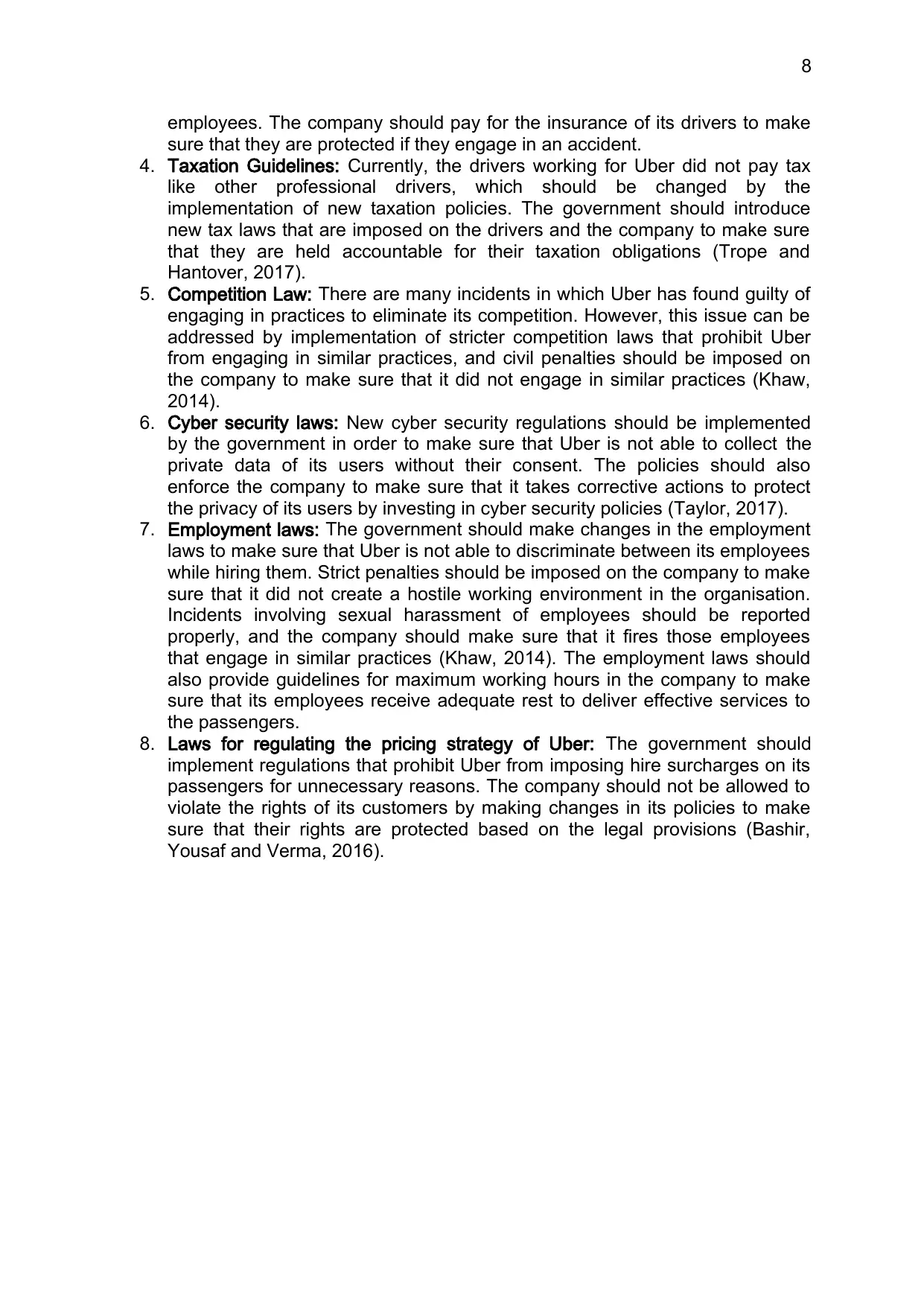
8
employees. The company should pay for the insurance of its drivers to make
sure that they are protected if they engage in an accident.
4. Taxation Guidelines: Currently, the drivers working for Uber did not pay tax
like other professional drivers, which should be changed by the
implementation of new taxation policies. The government should introduce
new tax laws that are imposed on the drivers and the company to make sure
that they are held accountable for their taxation obligations (Trope and
Hantover, 2017).
5. Competition Law: There are many incidents in which Uber has found guilty of
engaging in practices to eliminate its competition. However, this issue can be
addressed by implementation of stricter competition laws that prohibit Uber
from engaging in similar practices, and civil penalties should be imposed on
the company to make sure that it did not engage in similar practices (Khaw,
2014).
6. Cyber security laws: New cyber security regulations should be implemented
by the government in order to make sure that Uber is not able to collect the
private data of its users without their consent. The policies should also
enforce the company to make sure that it takes corrective actions to protect
the privacy of its users by investing in cyber security policies (Taylor, 2017).
7. Employment laws: The government should make changes in the employment
laws to make sure that Uber is not able to discriminate between its employees
while hiring them. Strict penalties should be imposed on the company to make
sure that it did not create a hostile working environment in the organisation.
Incidents involving sexual harassment of employees should be reported
properly, and the company should make sure that it fires those employees
that engage in similar practices (Khaw, 2014). The employment laws should
also provide guidelines for maximum working hours in the company to make
sure that its employees receive adequate rest to deliver effective services to
the passengers.
8. Laws for regulating the pricing strategy of Uber: The government should
implement regulations that prohibit Uber from imposing hire surcharges on its
passengers for unnecessary reasons. The company should not be allowed to
violate the rights of its customers by making changes in its policies to make
sure that their rights are protected based on the legal provisions (Bashir,
Yousaf and Verma, 2016).
employees. The company should pay for the insurance of its drivers to make
sure that they are protected if they engage in an accident.
4. Taxation Guidelines: Currently, the drivers working for Uber did not pay tax
like other professional drivers, which should be changed by the
implementation of new taxation policies. The government should introduce
new tax laws that are imposed on the drivers and the company to make sure
that they are held accountable for their taxation obligations (Trope and
Hantover, 2017).
5. Competition Law: There are many incidents in which Uber has found guilty of
engaging in practices to eliminate its competition. However, this issue can be
addressed by implementation of stricter competition laws that prohibit Uber
from engaging in similar practices, and civil penalties should be imposed on
the company to make sure that it did not engage in similar practices (Khaw,
2014).
6. Cyber security laws: New cyber security regulations should be implemented
by the government in order to make sure that Uber is not able to collect the
private data of its users without their consent. The policies should also
enforce the company to make sure that it takes corrective actions to protect
the privacy of its users by investing in cyber security policies (Taylor, 2017).
7. Employment laws: The government should make changes in the employment
laws to make sure that Uber is not able to discriminate between its employees
while hiring them. Strict penalties should be imposed on the company to make
sure that it did not create a hostile working environment in the organisation.
Incidents involving sexual harassment of employees should be reported
properly, and the company should make sure that it fires those employees
that engage in similar practices (Khaw, 2014). The employment laws should
also provide guidelines for maximum working hours in the company to make
sure that its employees receive adequate rest to deliver effective services to
the passengers.
8. Laws for regulating the pricing strategy of Uber: The government should
implement regulations that prohibit Uber from imposing hire surcharges on its
passengers for unnecessary reasons. The company should not be allowed to
violate the rights of its customers by making changes in its policies to make
sure that their rights are protected based on the legal provisions (Bashir,
Yousaf and Verma, 2016).
⊘ This is a preview!⊘
Do you want full access?
Subscribe today to unlock all pages.

Trusted by 1+ million students worldwide
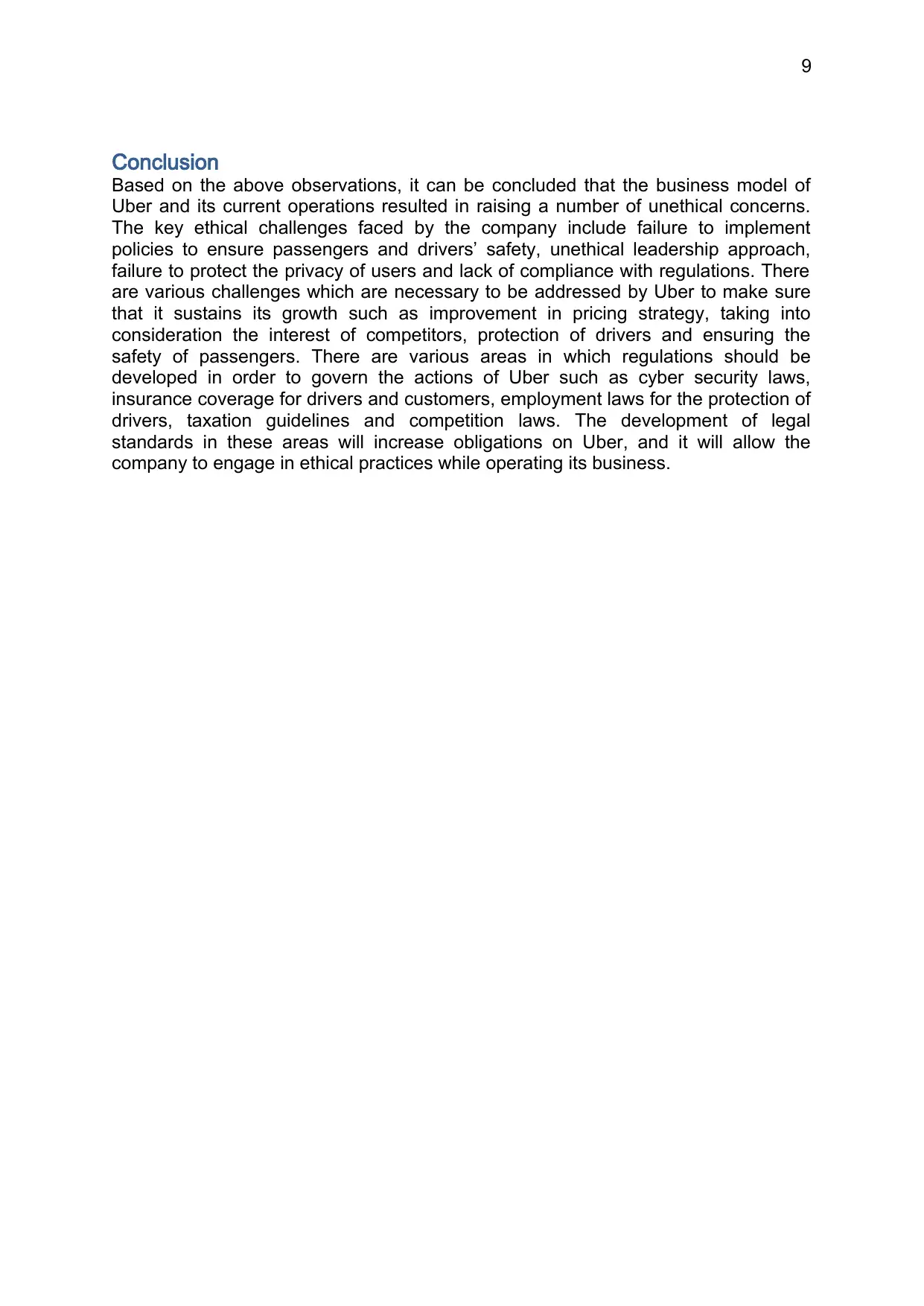
9
Conclusion
Based on the above observations, it can be concluded that the business model of
Uber and its current operations resulted in raising a number of unethical concerns.
The key ethical challenges faced by the company include failure to implement
policies to ensure passengers and drivers’ safety, unethical leadership approach,
failure to protect the privacy of users and lack of compliance with regulations. There
are various challenges which are necessary to be addressed by Uber to make sure
that it sustains its growth such as improvement in pricing strategy, taking into
consideration the interest of competitors, protection of drivers and ensuring the
safety of passengers. There are various areas in which regulations should be
developed in order to govern the actions of Uber such as cyber security laws,
insurance coverage for drivers and customers, employment laws for the protection of
drivers, taxation guidelines and competition laws. The development of legal
standards in these areas will increase obligations on Uber, and it will allow the
company to engage in ethical practices while operating its business.
Conclusion
Based on the above observations, it can be concluded that the business model of
Uber and its current operations resulted in raising a number of unethical concerns.
The key ethical challenges faced by the company include failure to implement
policies to ensure passengers and drivers’ safety, unethical leadership approach,
failure to protect the privacy of users and lack of compliance with regulations. There
are various challenges which are necessary to be addressed by Uber to make sure
that it sustains its growth such as improvement in pricing strategy, taking into
consideration the interest of competitors, protection of drivers and ensuring the
safety of passengers. There are various areas in which regulations should be
developed in order to govern the actions of Uber such as cyber security laws,
insurance coverage for drivers and customers, employment laws for the protection of
drivers, taxation guidelines and competition laws. The development of legal
standards in these areas will increase obligations on Uber, and it will allow the
company to engage in ethical practices while operating its business.
Paraphrase This Document
Need a fresh take? Get an instant paraphrase of this document with our AI Paraphraser
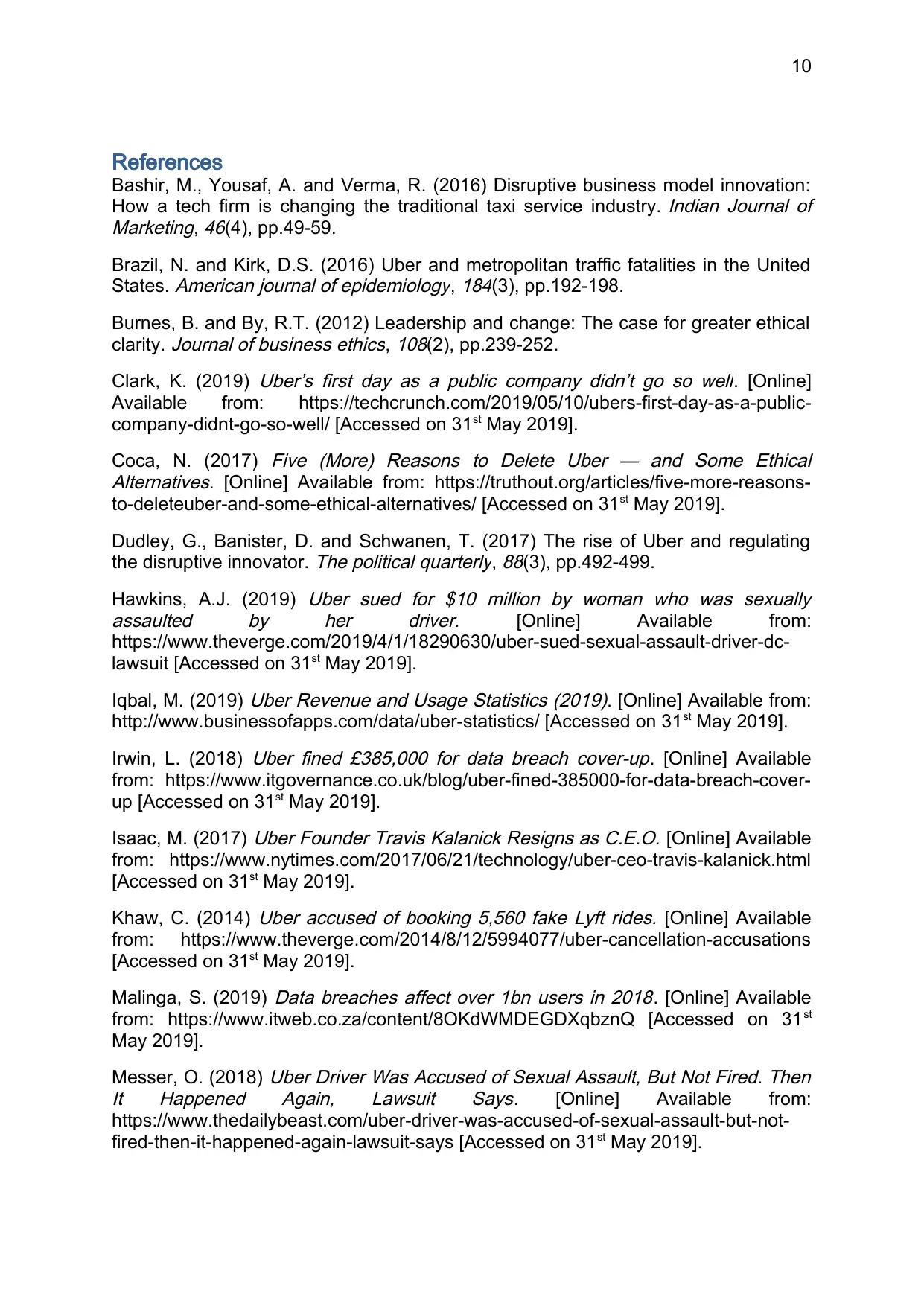
10
References
Bashir, M., Yousaf, A. and Verma, R. (2016) Disruptive business model innovation:
How a tech firm is changing the traditional taxi service industry.
Indian Journal of
Marketing,
46(4), pp.49-59.
Brazil, N. and Kirk, D.S. (2016) Uber and metropolitan traffic fatalities in the United
States.
American journal of epidemiology,
184(3), pp.192-198.
Burnes, B. and By, R.T. (2012) Leadership and change: The case for greater ethical
clarity.
Journal of business ethics,
108(2), pp.239-252.
Clark, K. (2019)
Uber’s first day as a public company didn’t go so well. [Online]
Available from: https://techcrunch.com/2019/05/10/ubers-first-day-as-a-public-
company-didnt-go-so-well/ [Accessed on 31st May 2019].
Coca, N. (2017)
Five (More) Reasons to Delete Uber — and Some Ethical
Alternatives. [Online] Available from: https://truthout.org/articles/five-more-reasons-
to-deleteuber-and-some-ethical-alternatives/ [Accessed on 31st May 2019].
Dudley, G., Banister, D. and Schwanen, T. (2017) The rise of Uber and regulating
the disruptive innovator.
The political quarterly,
88(3), pp.492-499.
Hawkins, A.J. (2019)
Uber sued for $10 million by woman who was sexually
assaulted by her driver. [Online] Available from:
https://www.theverge.com/2019/4/1/18290630/uber-sued-sexual-assault-driver-dc-
lawsuit [Accessed on 31st May 2019].
Iqbal, M. (2019)
Uber Revenue and Usage Statistics (2019). [Online] Available from:
http://www.businessofapps.com/data/uber-statistics/ [Accessed on 31st May 2019].
Irwin, L. (2018)
Uber fined £385,000 for data breach cover-up. [Online] Available
from: https://www.itgovernance.co.uk/blog/uber-fined-385000-for-data-breach-cover-
up [Accessed on 31st May 2019].
Isaac, M. (2017)
Uber Founder Travis Kalanick Resigns as C.E.O. [Online] Available
from: https://www.nytimes.com/2017/06/21/technology/uber-ceo-travis-kalanick.html
[Accessed on 31st May 2019].
Khaw, C. (2014)
Uber accused of booking 5,560 fake Lyft rides. [Online] Available
from: https://www.theverge.com/2014/8/12/5994077/uber-cancellation-accusations
[Accessed on 31st May 2019].
Malinga, S. (2019)
Data breaches affect over 1bn users in 2018. [Online] Available
from: https://www.itweb.co.za/content/8OKdWMDEGDXqbznQ [Accessed on 31st
May 2019].
Messer, O. (2018)
Uber Driver Was Accused of Sexual Assault, But Not Fired. Then
It Happened Again, Lawsuit Says. [Online] Available from:
https://www.thedailybeast.com/uber-driver-was-accused-of-sexual-assault-but-not-
fired-then-it-happened-again-lawsuit-says [Accessed on 31st May 2019].
References
Bashir, M., Yousaf, A. and Verma, R. (2016) Disruptive business model innovation:
How a tech firm is changing the traditional taxi service industry.
Indian Journal of
Marketing,
46(4), pp.49-59.
Brazil, N. and Kirk, D.S. (2016) Uber and metropolitan traffic fatalities in the United
States.
American journal of epidemiology,
184(3), pp.192-198.
Burnes, B. and By, R.T. (2012) Leadership and change: The case for greater ethical
clarity.
Journal of business ethics,
108(2), pp.239-252.
Clark, K. (2019)
Uber’s first day as a public company didn’t go so well. [Online]
Available from: https://techcrunch.com/2019/05/10/ubers-first-day-as-a-public-
company-didnt-go-so-well/ [Accessed on 31st May 2019].
Coca, N. (2017)
Five (More) Reasons to Delete Uber — and Some Ethical
Alternatives. [Online] Available from: https://truthout.org/articles/five-more-reasons-
to-deleteuber-and-some-ethical-alternatives/ [Accessed on 31st May 2019].
Dudley, G., Banister, D. and Schwanen, T. (2017) The rise of Uber and regulating
the disruptive innovator.
The political quarterly,
88(3), pp.492-499.
Hawkins, A.J. (2019)
Uber sued for $10 million by woman who was sexually
assaulted by her driver. [Online] Available from:
https://www.theverge.com/2019/4/1/18290630/uber-sued-sexual-assault-driver-dc-
lawsuit [Accessed on 31st May 2019].
Iqbal, M. (2019)
Uber Revenue and Usage Statistics (2019). [Online] Available from:
http://www.businessofapps.com/data/uber-statistics/ [Accessed on 31st May 2019].
Irwin, L. (2018)
Uber fined £385,000 for data breach cover-up. [Online] Available
from: https://www.itgovernance.co.uk/blog/uber-fined-385000-for-data-breach-cover-
up [Accessed on 31st May 2019].
Isaac, M. (2017)
Uber Founder Travis Kalanick Resigns as C.E.O. [Online] Available
from: https://www.nytimes.com/2017/06/21/technology/uber-ceo-travis-kalanick.html
[Accessed on 31st May 2019].
Khaw, C. (2014)
Uber accused of booking 5,560 fake Lyft rides. [Online] Available
from: https://www.theverge.com/2014/8/12/5994077/uber-cancellation-accusations
[Accessed on 31st May 2019].
Malinga, S. (2019)
Data breaches affect over 1bn users in 2018. [Online] Available
from: https://www.itweb.co.za/content/8OKdWMDEGDXqbznQ [Accessed on 31st
May 2019].
Messer, O. (2018)
Uber Driver Was Accused of Sexual Assault, But Not Fired. Then
It Happened Again, Lawsuit Says. [Online] Available from:
https://www.thedailybeast.com/uber-driver-was-accused-of-sexual-assault-but-not-
fired-then-it-happened-again-lawsuit-says [Accessed on 31st May 2019].
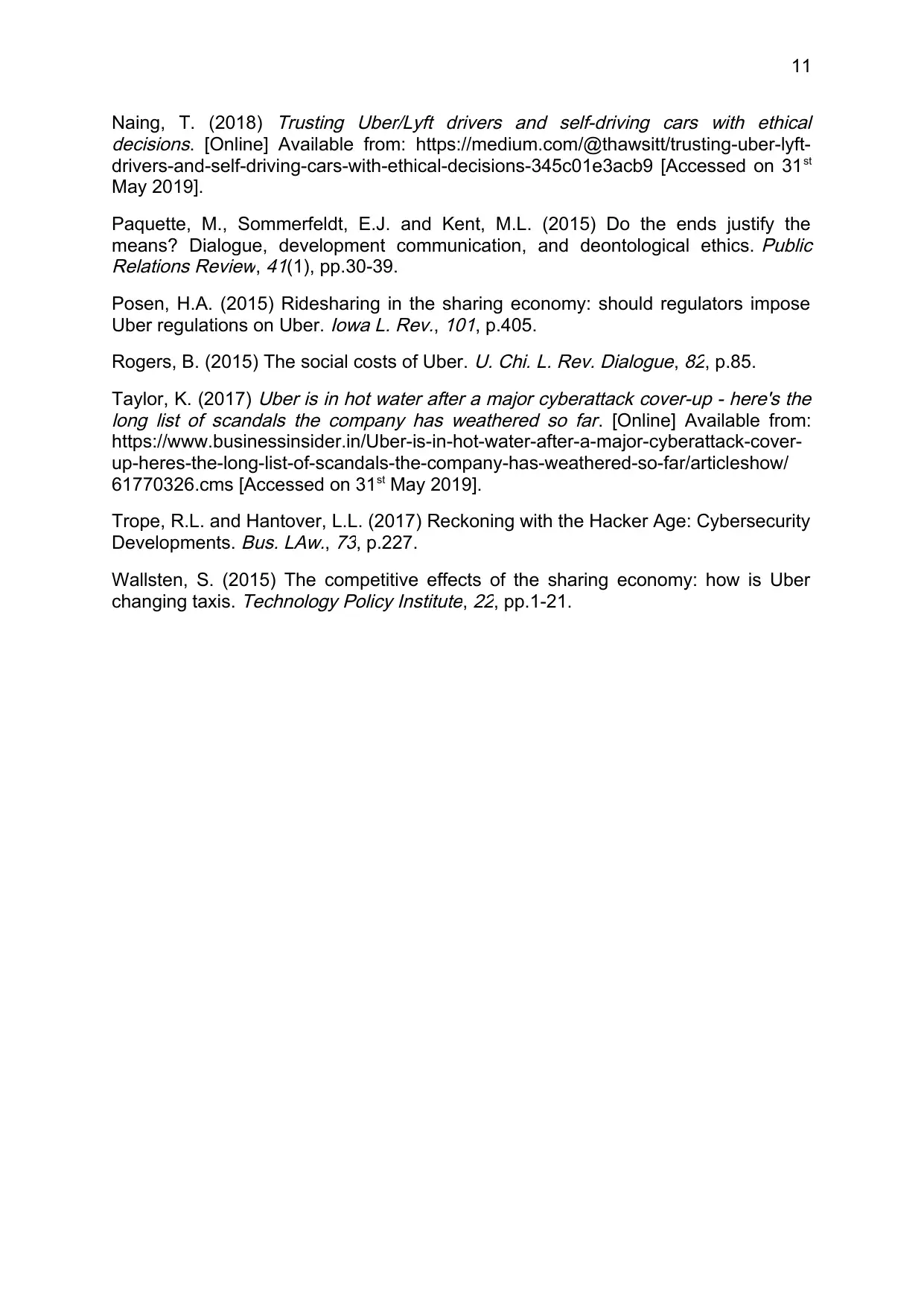
11
Naing, T. (2018)
Trusting Uber/Lyft drivers and self-driving cars with ethical
decisions. [Online] Available from: https://medium.com/@thawsitt/trusting-uber-lyft-
drivers-and-self-driving-cars-with-ethical-decisions-345c01e3acb9 [Accessed on 31st
May 2019].
Paquette, M., Sommerfeldt, E.J. and Kent, M.L. (2015) Do the ends justify the
means? Dialogue, development communication, and deontological ethics.
Public
Relations Review,
41(1), pp.30-39.
Posen, H.A. (2015) Ridesharing in the sharing economy: should regulators impose
Uber regulations on Uber.
Iowa L. Rev.,
101, p.405.
Rogers, B. (2015) The social costs of Uber.
U. Chi. L. Rev. Dialogue,
82, p.85.
Taylor, K. (2017)
Uber is in hot water after a major cyberattack cover-up - here's the
long list of scandals the company has weathered so far. [Online] Available from:
https://www.businessinsider.in/Uber-is-in-hot-water-after-a-major-cyberattack-cover-
up-heres-the-long-list-of-scandals-the-company-has-weathered-so-far/articleshow/
61770326.cms [Accessed on 31st May 2019].
Trope, R.L. and Hantover, L.L. (2017) Reckoning with the Hacker Age: Cybersecurity
Developments.
Bus. LAw.,
73, p.227.
Wallsten, S. (2015) The competitive effects of the sharing economy: how is Uber
changing taxis.
Technology Policy Institute,
22, pp.1-21.
Naing, T. (2018)
Trusting Uber/Lyft drivers and self-driving cars with ethical
decisions. [Online] Available from: https://medium.com/@thawsitt/trusting-uber-lyft-
drivers-and-self-driving-cars-with-ethical-decisions-345c01e3acb9 [Accessed on 31st
May 2019].
Paquette, M., Sommerfeldt, E.J. and Kent, M.L. (2015) Do the ends justify the
means? Dialogue, development communication, and deontological ethics.
Public
Relations Review,
41(1), pp.30-39.
Posen, H.A. (2015) Ridesharing in the sharing economy: should regulators impose
Uber regulations on Uber.
Iowa L. Rev.,
101, p.405.
Rogers, B. (2015) The social costs of Uber.
U. Chi. L. Rev. Dialogue,
82, p.85.
Taylor, K. (2017)
Uber is in hot water after a major cyberattack cover-up - here's the
long list of scandals the company has weathered so far. [Online] Available from:
https://www.businessinsider.in/Uber-is-in-hot-water-after-a-major-cyberattack-cover-
up-heres-the-long-list-of-scandals-the-company-has-weathered-so-far/articleshow/
61770326.cms [Accessed on 31st May 2019].
Trope, R.L. and Hantover, L.L. (2017) Reckoning with the Hacker Age: Cybersecurity
Developments.
Bus. LAw.,
73, p.227.
Wallsten, S. (2015) The competitive effects of the sharing economy: how is Uber
changing taxis.
Technology Policy Institute,
22, pp.1-21.
⊘ This is a preview!⊘
Do you want full access?
Subscribe today to unlock all pages.

Trusted by 1+ million students worldwide
1 out of 12
Related Documents
Your All-in-One AI-Powered Toolkit for Academic Success.
+13062052269
info@desklib.com
Available 24*7 on WhatsApp / Email
![[object Object]](/_next/static/media/star-bottom.7253800d.svg)
Unlock your academic potential
Copyright © 2020–2026 A2Z Services. All Rights Reserved. Developed and managed by ZUCOL.




